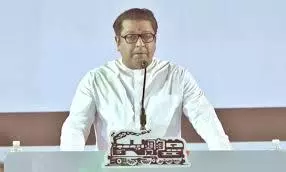
Raj Thackeray urges Maharashtra to defend Marathi, citing Tamil Nadu’s stand against Hindi
text_fieldsMaharashtra Navnirman Sena (MNS) chief Raj Thackeray has called for Maharashtra to take inspiration from southern states, particularly Tamil Nadu, in resisting the perceived imposition of Hindi under the National Education Policy (NEP).
Speaking to his party members, Thackeray emphasised the importance of preserving regional languages and criticised Maharashtra’s passive stance on the matter.
“Have you seen the southern states? Have you seen Tamil Nadu? See how they have opposed the Hindi language,” Thackeray remarked, highlighting the state’s strong resistance to the three-language formula proposed by the NEP.
His comments come amid ongoing debates over the cultural implications of promoting Hindi at the expense of regional languages.
Thackeray, known for championing Maratha pride and the use of Marathi across Maharashtra, stressed that “every state’s language should be respected” and urged his supporters to ensure Marathi continues to thrive, especially in Mumbai.
Tamil Nadu’s Chief Minister MK Stalin has repeatedly argued that the NEP’s language policy threatens the survival of several regional languages, including Marathi. His son, Udhayanidhi Stalin, provided a list of languages allegedly endangered due to limited usage, aligning the DMK’s stance against what it describes as a push for cultural homogenisation.
The DMK maintains that its two-language system of Tamil and English is effective and culturally appropriate, pointing out that Tamil Nadu is the second-largest contributor to India’s economy despite rejecting the three-language model.
The BJP, however, insists that the NEP offers a wide selection of languages beyond Hindi, allowing students to choose their third language. The party argues that this flexibility can enhance inter-state communication and cultural exchange.
In Madhya Pradesh, a BJP-ruled state, authorities plan to offer various optional languages, including Marathi, Tamil, Telugu, Bengali, Gujarati, and Punjabi, in colleges. However, there are concerns about implementation, particularly regarding faculty recruitment and minimum enrollment requirements.
Inder Singh Parmar, Madhya Pradesh’s Higher Education Minister, described the initiative as a step toward creating “a hub of linguistic diversity.”
The DMK continues to pressure the central government over funds allegedly withheld due to Tamil Nadu’s refusal to adopt the NEP. The party’s spokesperson, TKS Elangovan, accused the government of trying to dismantle Tamil Nadu’s top-ranking education system in favour of a more traditional, Vedic-style approach.























